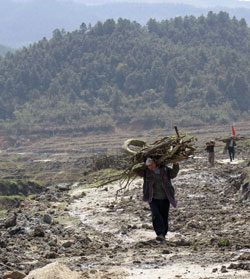China enlists NGO help in poverty fight
(Reuters)Updated: 2007-04-09 10:07
Zhang Fengjiao might not be a development expert, but she knows what she needs to improve her lot -- a proper road to her village so she can take her products to market with relative ease.
Her wish is on its way to being granted under a pilot project that is exploring the potential for the Chinese government to work with non-governmental organizations (NGOs) in tackling poverty in the world's most populous country.
 A man carries a bundle of firewood along a road under construction in Jinzhu village of Jiangxi province in this March 21, 2007 file photo.[Reuters] |
Zhang currently has to trudge about 2-km (1.6 miles) along a muddy, red-dirt path just to get from her home to the main part of Jinzhu, a remote village in a mountainous part of Jiangxi province in China's southern interior.
But the promise of a new road has given Zhang and her husband enough confidence to plant an orchard of lychee trees and medicinal herbs -- products that fetch higher prices, but are more risky than staples like rice if the market is hard to reach.
"I have the spirit to do more with my land. I have enough land -- I just haven't made good enough use of it yet," she said. The Chinese government would pay for such a road as it is increasing spending on rural areas, especially on health and education.
What sets this pilot project apart is that it addresses the need for more nimble efforts to help the 21.5 million people living below the official absolute poverty line of 693 yuan ($90) a year, who are increasingly clustered in hard-to-reach areas.
That's where NGOs come in. The government increasingly recognizes their strengths in reaching out to disadvantaged groups, and so it is experimenting in Jiangxi with essentially sub-contracting some of its poverty relief work to NGOs, through a bidding process.
The selected NGOs go to their assigned villages to listen to residents about how they want their 500,000 yuan in government aid to be spent. They then help implement the plans.
Each NGO receives up to 50,000 yuan per village to cover its costs, provided by the Asian Development Bank (ADB), which is assisting in the project with the help of British funding.
BASIC AMENITIES IMPROVE LIVES
Chris Spohr, an economist with the ADB in Beijing, said the government's readiness to take NGOs on as partners showed its commitment to spreading the benefits of prosperity more evenly.
"It suggests that terms like 'building a harmonious society' and 'government role transformation' are not merely rhetoric, but are being at least cautiously explored and pushed ahead," Spohr said, referring to two stock phrases the leadership has employed to etch out its priorities for reform.
The step of transferring government funds to the bank
account of a civil society organization, for it to spend on behalf of citizens,
could be seen as undercutting the power of local officials to control the purse
strings.
| 1 | 2 |  |
|
||
|
||
|
|